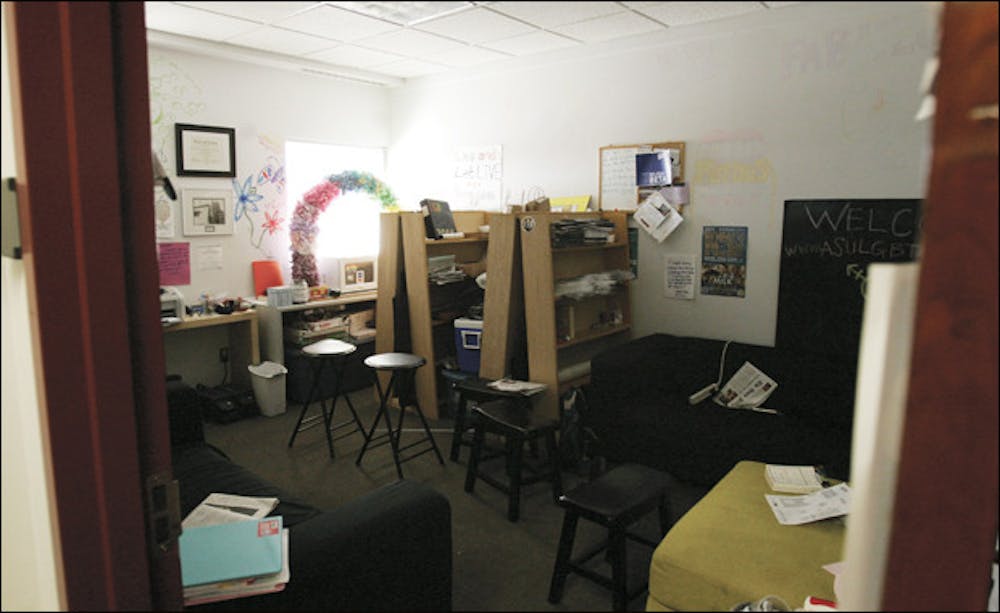Room No. 340 in the Memorial Union is approximately 180 square feet large, but student leaders are saying it is no longer enough to serve LGBTQ students at ASU.
The Lesbian, Gay, Bisexual, Trans and Queer Coalition submitted a proposal to create an LGBTQ resource center to Student Affairs in January, and is currently negotiating terms for the center, said club co-director Kendall Gerdes.
“Our office space currently has to function as an office space, a work space, a storage space, a meeting space and most importantly, a safe space,” she said. “And the current amount of space is inadequate to meet those needs.”
ASU is currently the only PAC-10 school without a designated LGBTQ resource center on campus, according to the Consortium of Higher Education LGBT Resource Professionals. But additional space may be hard to come by.
Gerdes, an English senior, said the LGBTQ Coalition’s requests of the University are simple: funds for startup costs and the designation of a “centralized, physical space” on the Tempe campus where members of the LGBTQ community can feel safe discussing sensitive issues, such as how to “come out” to family and friends and getting health care.
The mission of the LGBTQ Center stated in the proposal is to establish an official resource center on the Tempe campus under the leadership of a coordinator compensated by a tuition waiver and stipend. This designated physical space would serve as a headquarters for LGBTQ information and emotional support, while the leadership of a paid supervisor would provide more programming stability than the coalition’s current all-volunteer system.
Gerdes said that in initial talks with ASU administration, she received positive feedback about establishing a paid, full-time center coordinator. However, she said she felt ASU officials were hesitant to commit to designating a physical space on campus for an LGBTQ Center.
Officials from Student Affairs could not be reached for direct comment, but dean of Student Affairs Mistalene Calleroz White said in an e-mail that “we are in agreement with the vision of the proposal.”
However, the statement went on to say that the term “center” is
traditionally defined as any physical space or building, and that the LGBTQ Coalition already has comparable physical space to other student groups.
The proposal estimates that the LGBTQ Coalition would require approximately $8,000 in startup costs from ASU, plus the tuition waiver for the center coordinator. Gerdes said the organization realizes that ASU is in financial crisis and that long-term funding may be limited, but one of the center coordinator’s major duties would be to secure grants and scholarships so that the LGBTQ Center could become self-sufficient.
To fully meet the demands and needs of the LGBTQ community at ASU, according to the proposal, the LGBTQ Center would require three offices, a multipurpose room and a conference room.
The USG Senate endorsed the LGBTQ Center proposal on Feb. 17, said James Alling, chair of the University Affairs Committee, because the proposal established a realistic way to increase the welfare of students on campus at a fairly low cost and with space that’s already available. Alling, a bioengineering junior, said the endorsement is a nonbinding resolution that, more than anything else, is a commitment on the part of USG to support the LGBTQ Center proposal.
“They demonstrated a need for the community on campus to have a centralized location for advocacy, for resources, for support, for networking, and the best way for ASU to help the LGBTQ Coalition in their endeavor is to give them the space,” he said.
Gerdes said the ideal location for the LGBTQ Center would be the lower level of Best C Hall, which will be emptied as honors students begin to live in the new Barrett residence hall opening in fall 2009. However, she said the coalition would be willing to negotiate on the location of the center because the coalition’s first objective is to get the proposal approved and enacted as quickly as possible.
“There are ideals, and there is what is immediately practical” for an LGBTQ Center, she said. “We want to start at the closest practical step, so we can get working toward the ideal.”
Reach the reporter at trabens@asu.edu.




